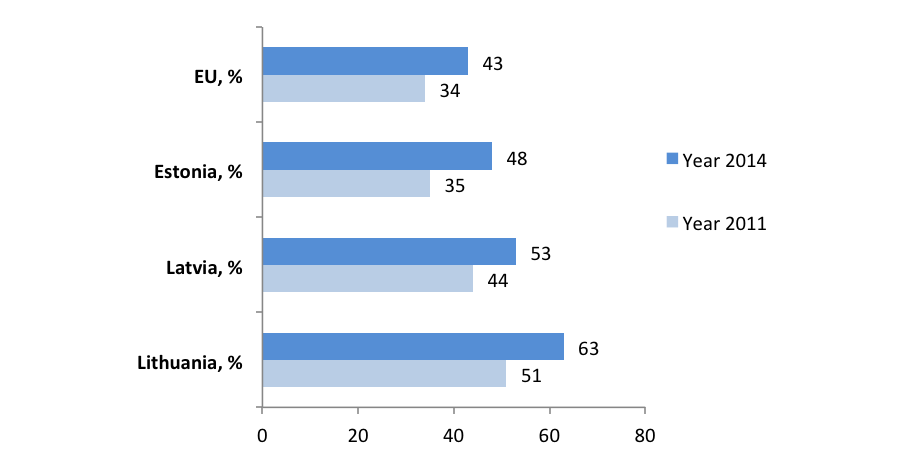According to the recent Eurobarometer survey No. 416 Attitudes of European citizens towards the environment (published on September, 2014) more than 60% of Lithuanians (highest score in the EU) and about half of population in Latvia and Estonia are worried about the health impact of chemicals in everyday products. In comparison to the Baltic States, the average level of concern in the European Union is around 40%. This is the 2nd most important environmental concern people in the Baltic countries note right after such issues as the air and water pollution and the growing amount of waste.
The level of concern about chemicals in products has increased significantly over the last three years in all the Baltic countries. We see a direct interlink to our BaltInfoHaz campaign which started with public events in 2012 – from end 2010 and in 2011 we prepared the information materials and did not appear in public yet. The biggest increase in percentage is in Estonia – from 35% in 2011 to 48% in 2014 (13%), next is Lithuania – from 51% to 63% (12% increase) and then Latvia – from 44% to 53%, nine percent of more concerned inhabitants since 2011.
Percentage of people who are worried about the impact on our health of chemicals used in everyday products
In the Baltics the survey also shows that people are ready to pay a bit more for environmentally friendly goods. More than two thirds (78% Latvians, 71% Lithuanians, 69% Estonians) of them expressed readiness to spend more money on ecological products.
However, the survey reveals that Baltic people are not so certain whether by purchasing eco-labelled goods for their daily needs they can safeguard the environment, they relate their concern more to their health. 33% of Latvians, 27% of Lithuanians and 23% Estonians think that this is one of the possibilities to protect the environment. It must be noted that this is still more than on average in the EU (22%).
The indicator showing incurred ecological purchases by people in the past months – this is where Lithuania and Latvia still lags behind the EU average. According to the Eurobarometersurvey, only 19% of Latvians and 15% of Lithuanians have bought eco-labelled goods. On average each fifth or 21% of the EU inhabitants have had a green purchase past month. From the Baltic countries only Estonia has reached that level. We are relating this phenomenon to the low availability of eco-labelled goods (local and foreign production) in the shops, not so much to the unwillingness of people to buy them. Very often in communication with the target groups we hear as prevailing question: “where can I buy, what can I buy”, but the supply is not following the demand – yet. The positive issue to note is that the percentage of people who are buying eco-labelled goods in the Baltic countries is slowly increasing from year to year and we also observe a slight increased of eco-labelled goods in shops, both, food stuff and other goods (cosmetics, body care, children care, toys, construction materials, household chemicals etc) – although the designation and sorting of shelves is still chaotic and shows inexperience of the shop management.
Percentage of people who acknowledged that they have bought environmentally friendly products marked with an environmental label during the past month
Eurobarometer surveys analyses public opinion on different issues in all EU member states and they are initiated by the European Commission. The above mentioned overview of citizens’ attitude towards chemicals in products is based on two special Eurobarometer surveysAttitudes of European citizens towards the environment No. 416 (published in 2014,http://ec.europa.eu/public_opinion/archives/ebs/ebs_416_en.pdf) and No. 365 (published in 2011, http://ec.europa.eu/public_opinion/archives/ebs/ebs_365_en.pdf).


